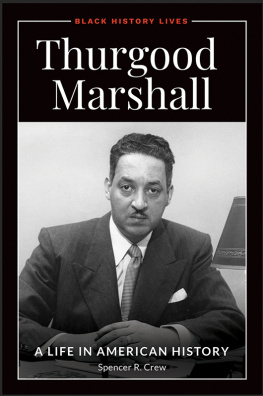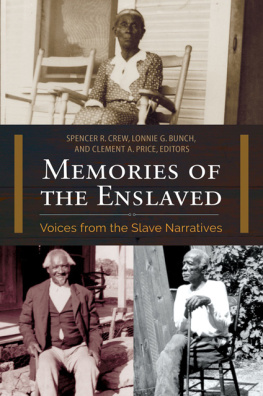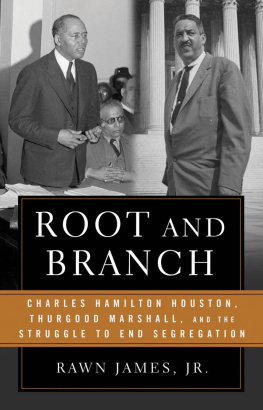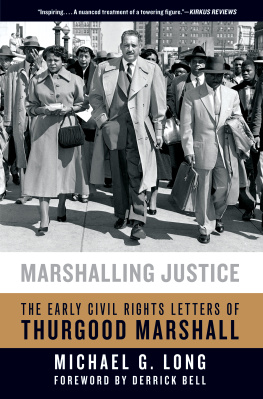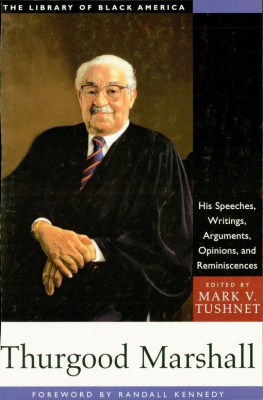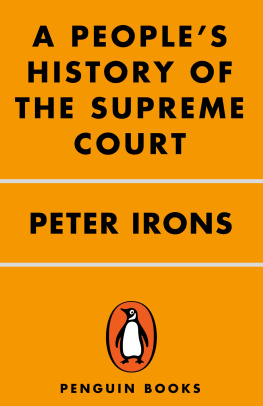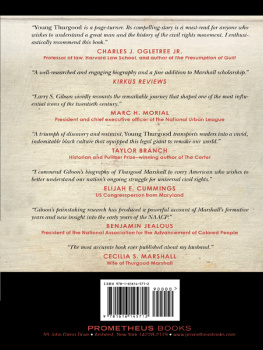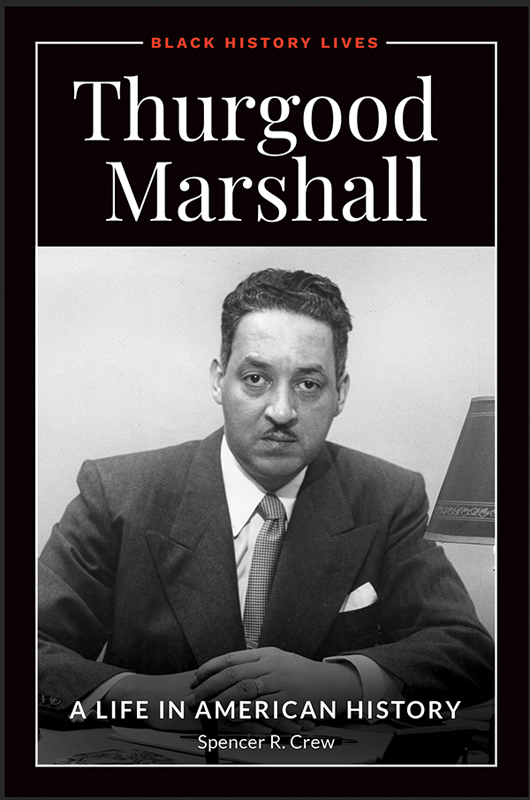Thurgood Marshall
Recent Titles in Black History Lives
W.E.B. Du Bois: A Life in American History
Charisse Burden-Stelly and Gerald Horne
Copyright 2019 by ABC-CLIO, LLC
All rights reserved. No part of this publication may be reproduced, stored in a retrieval system, or transmitted, in any form or by any means, electronic, mechanical, photocopying, recording, or otherwise, except for the inclusion of brief quotations in a review, without prior permission in writing from the publisher.
Library of Congress Cataloging-in-Publication Data
Names: Crew, Spencer R., 1949
Title: Thurgood Marshall : a life in American history / Spencer R. Crew.
Description: Santa Barbara, California : ABC-CLIO, 2019. | Series: Black history lives | Includes bibliographical references and index.
Identifiers: LCCN 2019019626 (print) | LCCN 2019021763 (ebook) | ISBN 9781440861451 (eBook) | ISBN 9781440861444 (print : alk. paper)
Subjects: LCSH: Marshall, Thurgood, 1908-1993. | JudgesUnited States. | African American judgesBiography. | United States. Supreme CourtBiography.
Classification: LCC KF8745.M34 (ebook) | LCC KF8745.M34 C74 2019 (print) | DDC 347.73/2634 [B]dc23
LC record available at https://lccn.loc.gov/2019019626
ISBN: 978-1-4408-6144-4 (print)
978-1-4408-6145-1 (ebook)
23 22 21 20 19 1 2 3 4 5
This book is also available as an eBook.
ABC-CLIO
An Imprint of ABC-CLIO, LLC
ABC-CLIO, LLC
147 Castilian Drive
Santa Barbara, California 93117
www.abc-clio.com
This book is printed on acid-free paper 
Manufactured in the United States of America
Contents
The Black History Lives biography series explores and examines the lives of the most iconic figures in African American history, with supplementary material that highlights the subjects significance in our contemporary world. Volumes in this series offer far more than a simple retelling of a subjects life by providing readers with a greater understanding of the outside events and influences that shaped each subjects world, from familial relationships to political and cultural developments.
Each volume includes chronological chapters that detail events of the subjects life. The final chapter explores the cultural and historical significance of the individual and places their actions and beliefs within an overall historical context. Books in the series highlight important information about the individual through sidebars that connect readers to the larger context of social, political, intellectual, and pop culture in American history; a timeline listing significant events; key primary source excerpts; and a comprehensive bibliography for further research.
THURGOOD MARSHALL: A MAN WORTHY OF ADMIRATION
Thurgood Marshall retired from the Supreme Court more than a quarter of a century ago, and the memory of the importance of his contributions to African Americans and to the nation is beginning to fade. Most often, his name is currently brought up in comparison to his successor on the Supreme Court, Clarence Thomas, to contrast the very different views they have about interpreting the Constitution and protecting the rights of minorities. Marshall is also alluded to because he was the first African American to join the Supreme Court. But the focus on just these two points diminishes the significance of his contributions and breakthroughs, which are part of Marshalls legacy.
Thurgood Marshall was an icon even before he joined the Supreme Court. He worked for the National Association for the Advancement of Colored People (NAACP) in important legal capacities for twenty-seven years. During that time, he was involved in a myriad of court cases on behalf of African-American clients, with the goal of changing the biased legal environment in which African Americans had to function. Marshall was the embodiment of the belief of his mentor, Charles Hamilton Houston, that the lawyers Houston trained were social engineers. Their responsibility was to legally attack and change unjust laws discriminating against African Americans. During his NAACP years, Marshall was a tireless legal advocate, traveling to small towns in the South to defend African-American defendants. He did this despite the constant danger he faced in agreeing to make these trips. For example, he was nearly lynched in Tennessee for defending a group of men unfairly accused of inciting a riot and attempted murder. Even after this harrowing experience, he continued his mission.
The ultimate goal for Marshall was to seek cases that could make their way to the Supreme Court. There he hoped to obtain rulings that would have national impact. This did not preclude him from taking cases solely because of the injustice of the case. Discrimination angered him, and when possible, he sought to use whatever skill or influence he had to help however he could. His involvement resulted in several Supreme Court decisions that mandated that law schools and other higher education programs had to allow African-American applicants to matriculate to their schools in the absence of having truly separate and equal facilities to provide them. By the end of his career, including his two years as the first African-American solicitor general, Marshall had argued more cases before the Supreme Court than any other lawyer.
Even before the Brown v. Board ruling, Marshall had gained national notoriety for his legal efforts. The NAACP gave him their most prestigious award, the Spingarn Medal, in 1946, eight years before the Brown decision. On that occasion they hailed him an American hero for his efforts to end racial discrimination. It was his earlier legal work along with the victory in the Brown case that made Marshall the best candidate for nomination by President Johnson as the first African-American Supreme Court justice.
But this important prelude to his Supreme Court fame does not register as strongly in present-day popular memory. This amnesia is due in part to the dearth of more recent comprehensive biographies of Marshall. The most inclusive biographies of his life are Dream Makers; Dream Breakers: The World of Justice Thurgood Marshall, written by Carl Rowan in 1993; and Thurgood Marshall: American Revolutionary, written by Juan Williams in 1998. Each of their books sought to depict the evolution of Marshall from a youngster in Baltimore through his resignation from the Supreme Court. More recent books written about Marshall tend to focus more on particular aspects of his life. Larry Gibsons Young Thurgood: The Making of a Supreme Court Justice and Mary Dudziaks Exporting American Dreams: Thurgood Marshalls African Journey are good examples. They offer important insights into key parts of Marshalls life but do not examine Marshalls breath of accomplishments.
Understanding the full measure of Thurgood Marshall and his many accomplishments, especially before he joins the Supreme Court, is the heart of this study. The generation that immediately benefited from his work with the NAACP is disappearing, and with them is evaporating the overall significance of Marshalls contributions. Living conditions for African Americans in the South and the North were extremely circumscribed in the years before the Brown decision. African Americans faced violence, forced confessions, and capricious treatment by law officials on a regular basis. A strong belief that the legal system could change this environment and eventually rule against discrimination was necessary in order to sustain the years of effort put in by Marshall and the NAACP.

